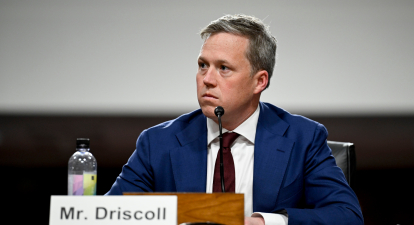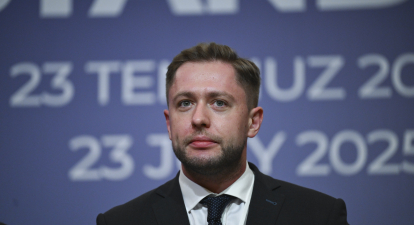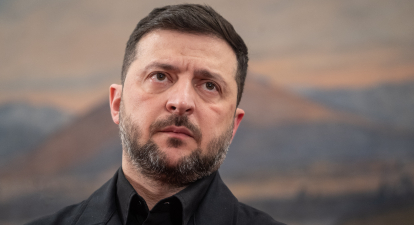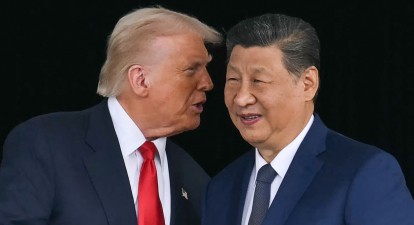
According to Donald Trump, the Busan summit with Xi Jinping was a “twelve out of ten.” Photo Getty Images
The Busan summit between Donald Trump and Xi Jinping was the most notable diplomatic gesture of the fall and at the same time a signal that the global economic balance is shifting. Why is the US retreating in the trade war, while China is now increasing its influence? Highlights from materials by Reuters, Politico and The Economist
Buy an annual subscription to six Forbes Ukraine magazines for the price of four issues. If you value the quality, depth, and power of real-world experience, this subscription is for you.
On October 30, US President Donald Trump and Chinese leader Xi Jinping held their first face-to-face meeting in six years in Busan, South Korea. According to Trump, the summit went “twelve out of ten.” However, as The Economist notes, its results resemble a temporary truce rather than a new coordinate system in relations between the world’s two largest economies.
The meeting was preceded by an escalation of the trade conflict between the United States and China. Washington was preparing a 100 percent tariff on Chinese goods, while Beijing was preparing to restrict the export of rare earth metals, which are critical to global industry.

Popular Category Money Date October 27 100 days of Svyrydenko's government. Forbes Ukraine collected 13 difficult questions from business for the Prime Minister. What she answered them
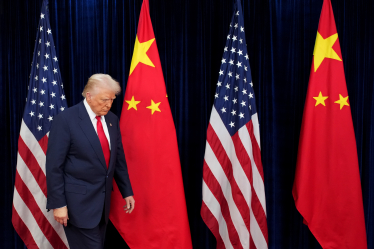
Trump's decision to skip the APEC summit looked like a rejection of an initiative launched by the US itself back in 1989. Photo by Getty Images
Temporary truce
The agreements between Trump and Xi provide for a year-long “ceasefire.” China has agreed to postpone export restrictions, and the United States has agreed to suspend new tariffs and cancel planned sanctions on subsidiaries of blacklisted Chinese corporations, The Economist writes.
The two sides have also settled their shipping disputes. Beijing will resume purchases of American soybeans, and Washington will reduce a punitive tariff from 20% to 10% in exchange for China’s tighter controls on the production of fentanyl precursors. At the same time, tariffs on Chinese goods remain at 47%, a level of protectionism that would have seemed unprecedented just a few years ago.
After the Busan talks — a moment that Reuters calls a “split-screen of global leadership” — Trump flew home while Xi Jinping headed to the Asia-Pacific Economic Cooperation (APEC) summit. The contrast symbolized a reversal of roles.
The US has increasingly gravitated towards isolationism, while China has positioned itself as a defender of free trade. In his opening speech at the summit, Xi said it was necessary to “update international trade rules to make them more relevant to the times.” His government also signed a revised free trade agreement between China and ASEAN, cementing regional economic integration.
Trump's decision not to participate in APEC appeared to be a rejection of an initiative that the United States created in 1989 to strengthen trade after the Cold War, writes Reuters. Instead, the Trump administration has focused on bilateral agreements, often with elements of pressure.
ASEAN participants noted that the American agreements did not provide for tariff reductions, but only promised new ones in the event of rapprochement of partners with states that “threaten US interests” – that is, with China. Against this background, Beijing looked like a more stable and systematic player, capable of building long-term relations in the region.
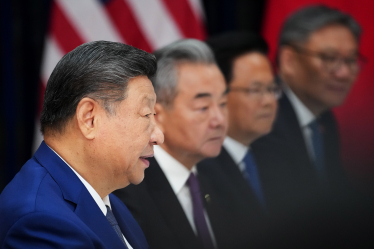
China is strengthening its position in the Asia-Pacific region and Europe, while the US focuses on domestic politics. Photo Getty Images
Europe in the game of foreign interests
European capitals perceived the Busan meeting as both a respite and a warning.
The one-year suspension of Chinese export restrictions has come as a relief to the EU, whose industry has been battered by the two giants' trade war, Politico reports. China supplies 98% of Europe's rare-earth magnets, and every swing in Beijing's policy has a ripple effect on European factory lines.
The temporary pause agreed between Trump and Xi gives Brussels a chance to implement the Critical Raw Materials Act and find alternative sources of supply. But the agreements are not legally binding, meaning either side can easily back out.
Amidst the pause in the US-China trade war, the EU is trying to find its own position between the two poles. Beijing increasingly sees Europe as a strategic partner: negotiations with Brussels are stalling, and disagreements between member states over tariffs on Chinese electric cars or cooperation in microchips only highlight its weakness, Politico adds.
In June 2025, the European Commission imposed tariffs on Chinese electric cars following an anti-subsidy investigation, but Germany, the largest exporter to China, opposed it. As a result, Europe looks like a playing field for the US and China to play out their own game.
For Ukraine, this meeting has a double meaning. The summit shows that the Russian-Ukrainian war is no longer an independent item on the global agenda, but is becoming part of a larger geoeconomic bargain. Ukraine was counting on Trump to try to convince Xi to limit purchases of Russian oil, but the US president admitted that this issue “was not discussed,” writes Politico.
The EU's growing dependence on Chinese raw materials and technology makes European support for Ukraine more vulnerable to changes in Chinese policy.
The Busan summit was not a conclusion, but a pause – “a respite before a new round,” notes The Economist. China and the United States maintain deep mutual distrust, but for now they recognize that they have more to gain from restraint than from confrontation.
For the rest of the world, this is a year to make the most of the respite: diversify trade ties, strengthen our own technological capabilities, and prepare for a new round of tensions between Washington and Beijing.
Materials on the topic

Category World Date Yesterday $800,000 for lobbyists and pardon as a deal. Binance founder Changpeng Zhao returns to the crypto game. How did he manage to reach an agreement with Donald Trump? WSJ analysis

Category World Date October 29 China overtakes US in global green race . How have Donald Trump's decisions changed the world's energy balance? FT analysis

Category World Date October 27 “Sanctions against Russian oil giants are just the beginning.” How is Ukraine building a strategic alliance with the US? Interview with Ambassador to Washington Olga Stefanishyna

Category World Date October 23 “Russia’s military machine suffers a major blow.” How are new US sanctions weakening Russia’s energy sector and increasing pressure on the aggressor’s allies? WSJ Analysis

Category World Date October 22 “Trump tends to support the opinion of the person he last spoke to.” Why was the second meeting between the US and Russian presidents canceled? Analysis by WSJ, Politico and FT

Category World Date October 23 “Trump doesn't want Alaska 2.0.” Where will the new round of White House diplomacy lead Ukraine? Interview with former US Ambassador John Herbst
